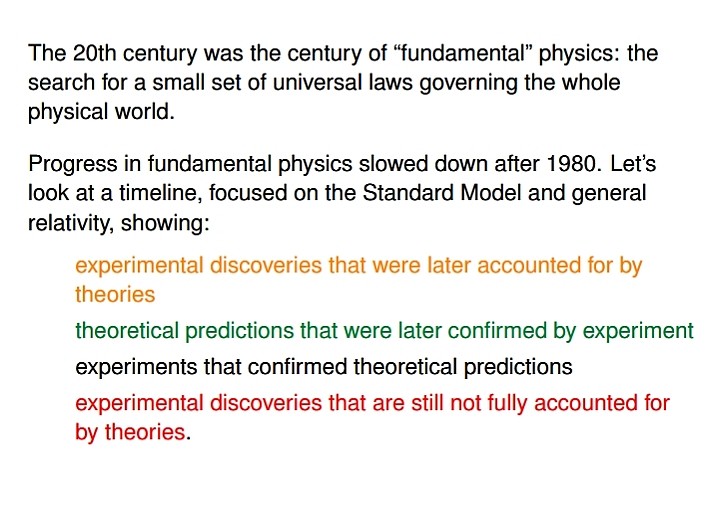John Carlos Baez on Nostr: Is fundamental physics really experiencing a Great Stagnation? In this thread, let's ...
Is fundamental physics really experiencing a Great Stagnation? In this thread, let's look at the history of fundamental physics from the dawn of the 20th century to now.
Experimental discoveries that were later accounted for by theories will be shown in yellow. (Mustard?)
Theoretical predictions that that were later confirmed by experiment are in green.
Experiments that confirmed theoretical predictions are in black.
Experiments that are still not accounted for by theories are shown in red.
(Yes, I'm a theorist. So to me, green means "success!" while red means "hey, we gotta do something here!)
One could argue endlessly about what to put on this list, and also what counts as "fundamental" physics. To me, the "fundamental" laws of physics are those that *in principle* we could use to compute all the physical quantities that we can compute at all.
The words "in principle' are carrying a lot of weight here. There are many laws, like formulas for turbulent fluid flow or masses of short-lived particles made of quarks, that we can't yet derive from the so-called "fundamental" laws. Yet most physicists think these are just signs of limitations in our ability to work with the fundamental laws, not new fundamental laws.
There is a long conversation to be had here about computability, chaos, etc. But that's not what these posts are about! Let's go back to the turn of the 20th century, and see how fundamental physics has grown since then.
Actually we should start in 1897.
(1/n)

Experimental discoveries that were later accounted for by theories will be shown in yellow. (Mustard?)
Theoretical predictions that that were later confirmed by experiment are in green.
Experiments that confirmed theoretical predictions are in black.
Experiments that are still not accounted for by theories are shown in red.
(Yes, I'm a theorist. So to me, green means "success!" while red means "hey, we gotta do something here!)
One could argue endlessly about what to put on this list, and also what counts as "fundamental" physics. To me, the "fundamental" laws of physics are those that *in principle* we could use to compute all the physical quantities that we can compute at all.
The words "in principle' are carrying a lot of weight here. There are many laws, like formulas for turbulent fluid flow or masses of short-lived particles made of quarks, that we can't yet derive from the so-called "fundamental" laws. Yet most physicists think these are just signs of limitations in our ability to work with the fundamental laws, not new fundamental laws.
There is a long conversation to be had here about computability, chaos, etc. But that's not what these posts are about! Let's go back to the turn of the 20th century, and see how fundamental physics has grown since then.
Actually we should start in 1897.
(1/n)
